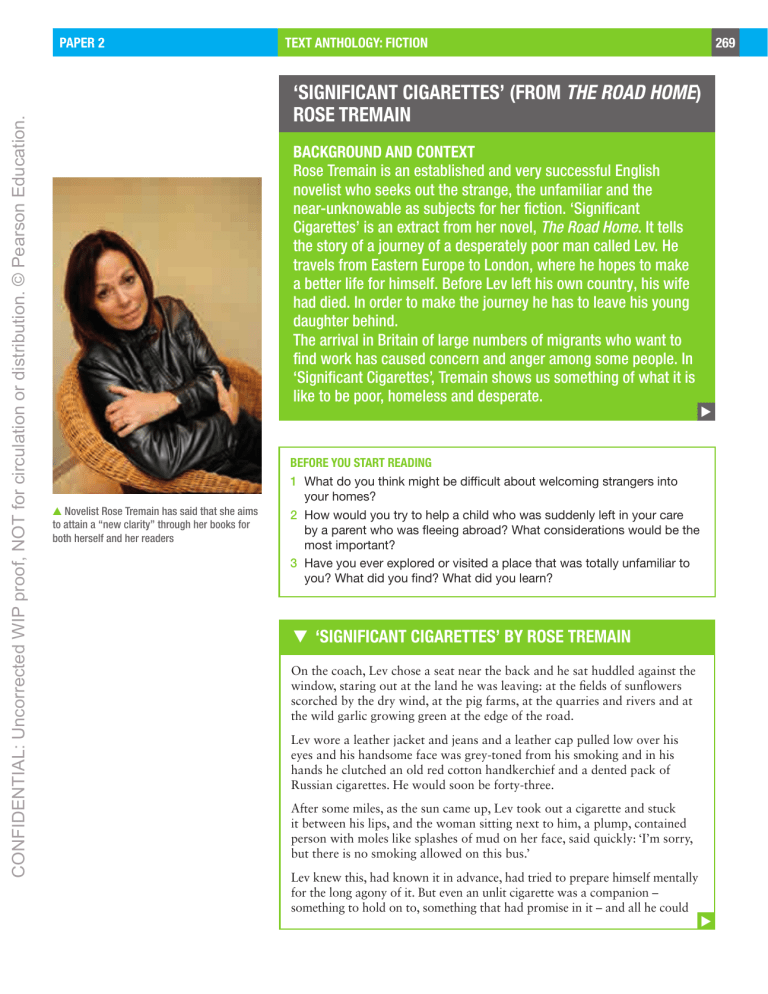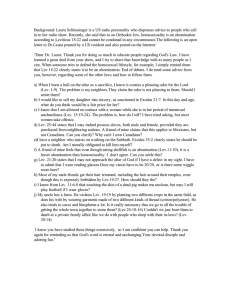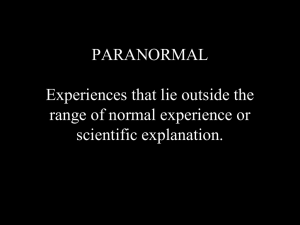
CONFIDENTIAL: Uncorrected WIP proof, NOT for circulation or distribution. © Pearson Education. PAPER 2 TEXT ANTHOLOGY: FICTION 269 ‘SIGNIFICANT CIGARETTES’ (FROM THE ROAD HOME) ROSE TREMAIN BACKGROUND AND CONTEXT Rose Tremain is an established and very successful English novelist who seeks out the strange, the unfamiliar and the near-unknowable as subjects for her fiction. ‘Significant Cigarettes’ is an extract from her novel, The Road Home. It tells the story of a journey of a desperately poor man called Lev. He travels from Eastern Europe to London, where he hopes to make a better life for himself. Before Lev left his own country, his wife had died. In order to make the journey he has to leave his young daughter behind. The arrival in Britain of large numbers of migrants who want to find work has caused concern and anger among some people. In ‘Significant Cigarettes’, Tremain shows us something of what it is like to be poor, homeless and desperate. ▲ Novelist Rose Tremain has said that she aims to attain a “new clarity” through her books for both herself and her readers ▶ BEFORE YOU START READING 1 What do you think might be difficult about welcoming strangers into your homes? 2 How would you try to help a child who was suddenly left in your care by a parent who was fleeing abroad? What considerations would be the most important? 3 Have you ever explored or visited a place that was totally unfamiliar to you? What did you find? What did you learn? ▼ ‘SIGNIFICANT CIGARETTES’ BY ROSE TREMAIN On the coach, Lev chose a seat near the back and he sat huddled against the window, staring out at the land he was leaving: at the fields of sunflowers scorched by the dry wind, at the pig farms, at the quarries and rivers and at the wild garlic growing green at the edge of the road. Lev wore a leather jacket and jeans and a leather cap pulled low over his eyes and his handsome face was grey-toned from his smoking and in his hands he clutched an old red cotton handkerchief and a dented pack of Russian cigarettes. He would soon be forty-three. After some miles, as the sun came up, Lev took out a cigarette and stuck it between his lips, and the woman sitting next to him, a plump, contained person with moles like splashes of mud on her face, said quickly: ‘I’m sorry, but there is no smoking allowed on this bus.’ Lev knew this, had known it in advance, had tried to prepare himself mentally for the long agony of it. But even an unlit cigarette was a companion – something to hold on to, something that had promise in it – and all he could ▶ CONFIDENTIAL: Uncorrected WIP proof, NOT for circulation or distribution. © Pearson Education. 270 PAPER 2 TEXT ANTHOLOGY: FICTION be bothered to do now was to nod, just to show the woman that he’d heard what she’d said, reassure her that he wasn’t going to cause trouble; because there they would have to sit for fifty hours or more, side by side with their separate aches and dreams, like a married couple. They would hear each other’s snores and sighs, smell the food and drink each had brought with them, note the degree to which each was fearful or unafraid, make short forays into conversation. And then later, when they finally arrived in London, they would probably separate with barely a word or a look, walk out into a rainy morning, each alone and beginning a new life. And Lev thought how all of this was odd but necessary and already told him things about the world he was travelling to, a world in which he would break his back working – if only that work could be found. He would hold himself apart from other people, find corners and shadows in which to sit and smoke, demonstrate that he didn’t need to belong, that his heart remained in his own country. There were two coach-drivers. These men would take turns to drive and to sleep. There was an on-board lavatory, so the only stops the bus would make would be for gas. At gas stations, the passengers would be able to clamber off, walk a few paces, see wild flowers on a verge, soiled paper among bushes, sun or rain on the road. They might stretch up their arms, put on dark glasses against the onrush of nature’s light, look for a clover leaf, smoke and stare at the cars rushing by. Then they would be herded back onto the coach, resume their old attitudes, arm themselves for the next hundred miles, for the stink of another industrial zone, or the sudden gleam of a lake, for rain and sunset and the approach of darkness on silent marshes. There would be times when the journey would seem to have no end. Sleeping upright was not something Lev was practised in. The old seemed to be able to do it, but forty-two was not yet old. Lev’s father, Stefan, sometimes used to sleep upright, in summer, on a hard wooden chair in his lunch break at the Baryn sawmill, with the hot sun falling onto the slices of sausage wrapped in paper on his knee and onto his flask of tea. Both Stefan and Lev could sleep lying down on a mound of hay or on the mossy carpet of a forest. Often, Lev had slept on a rag rug beside his daughter’s bed, when she was ill or afraid. And when his wife, Marina, was dying, he’d lain for five nights on an area of linoleum flooring no wider than his outstretched arm, between Marina’s hospital bed and a curtain patterned with pink and purple daisies, and sleep had come and gone in a mystifying kind of way, painting strange pictures in Lev’s brain that had never completely vanished. Towards evening, after two stops for gas, the mole-flecked woman unwrapped a hard-boiled egg. She peeled it silently. The smell of the egg reminded Lev of the sulphur springs at Jor, where he’d taken Marina, just in case nature could cure what man had given up for lost. Marina had immersed her body obediently in the scummy water, lain there looking at a female stork returning to its high nest, and said to Lev: ‘If only we were storks.’ ‘Why d’you say that?’ Lev had asked. ‘Because you never see a stork dying. It’s as though they didn’t die.’ If only we were storks. On the woman’s knee a clean cotton napkin was spread and her white hands smoothed it and she unwrapped rye bread and a twist of salt. ‘My name is Lev,’ said Lev. ▶ CONFIDENTIAL: Uncorrected WIP proof, NOT for circulation or distribution. © Pearson Education. PAPER 2 TEXT ANTHOLOGY: FICTION 271 ‘My name is Lydia,’ said the woman. And they shook hands, Lev’s hand holding the scrunched-up kerchief, and Lydia’s hand rough with salt and smelling of egg, and then Lev asked: ‘What are you planning to do in England?’ and Lydia said: ‘I have some interviews in London for jobs as a translator.’ ‘That sounds promising.’ ‘I hope so. I was a teacher of English at School 237 in Yarbl, so my language is very colloquial.’ Lev looked at Lydia. It wasn’t difficult to imagine her standing in front of a class and writing words on a blackboard. He said: ‘I wonder why you’re leaving our country when you had a good job at School 237 in Yarbl?’ ‘Well,’ said Lydia. ‘I became very tired of the view from my window. Every day, summer and winter, I looked out at the school yard and the high fence and the apartment block beyond, and I began to imagine I would die seeing these things, and I didn’t want this. I expect you understand what I mean?’ Lev took off his leather cap and ran his fingers through his thick grey hair. He saw Lydia turn to him for a moment and look very seriously into his eyes. He said: ‘Yes, I understand.’ Then there was a silence, while Lydia ate her hard-boiled egg. She chewed very quietly. When she’d finished the egg, Lev said: ‘My English isn’t too bad. I took some classes in Baryn, but my teacher told me my pronunciation wasn’t very good. May I say some words and you can tell me if I’m pronouncing them correctly?’ ‘Yes, of course,’ said Lydia. Lev said: ‘Lovely. Sorry. I am legal. How much please. Thank you. May you help me.’ ‘May I help you,’ corrected Lydia. ‘May I help you,’ repeated Lev. ‘Go on,’ said Lydia. ‘Stork,’ said Lev. ‘Stork’s nest. Rain. I am lost. I wish for an interpreter. Beeand-bee.’ ‘Be-and-be?’ said Lydia. ‘No, no. You mean “to be, or not to be”. ‘No,’ said Lev. ‘Bee-and-bee. Family hotel, quite cheap.’ ‘Oh, yes, I know. B & B.’ Lev could now see that darkness was falling outside the window and he thought how, in his village, darkness had always arrived in precisely the same way, from the same direction, above the same trees, whether early or late, whether in summer, winter or spring, for the whole of his life. This darkness – particular to that place, Auror – was how, in Lev’s heart, darkness would always fall. And so he told Lydia that he came from Auror, had worked in the Baryn sawmill until it closed two years ago, and since then he’d found no work at all and his family – his mother, his five-year-old daughter and he – had lived off the money his mother made selling jewellery manufactured from tin. ‘Oh,’ said Lydia. ‘I think that’s very resourceful, to make jewellery from tin.’ ‘Sure,’ said Lev. ‘But it isn’t enough.’ ▶ CONFIDENTIAL: Uncorrected WIP proof, NOT for circulation or distribution. © Pearson Education. 272 PAPER 2 TEXT ANTHOLOGY: FICTION Tucked into his boot was a small flask of vodka. He extracted the flask and took a long swig. Lydia kept eating her rye bread. Lev wiped his mouth with the red handkerchief and saw his face reflected in the coach window. He looked away. Since the death of Marina, he didn’t like to catch sight of his own reflection, because what he always saw in it was his own guilt at still being alive. ‘Why did the sawmill at Baryn close?’ asked Lydia. ‘They ran out of trees,’ said Lev. ‘Very bad,’ said Lydia. ‘What other work can you do?’ Lev drank again. Someone had told him that in England vodka was too expensive to drink. Immigrants made their own alcohol from potatoes and tap water, and when Lev thought about these industrious immigrants, he imagined them sitting by a coal fire in a tall house, talking and laughing, with rain falling outside the window and red buses going past and a television flickering in a corner of the room. He sighed and said: ‘I will do any work at all. My daughter Maya needs clothes, shoes, books, toys, everything. England is my hope.’ Towards ten o’clock, red blankets were given out to the coach passengers, some of whom were already sleeping. Lydia put away the remnants of her meal, covered her body with the blanket and switched on a fierce little light above her under the baggage rack and began reading a faded old paperback, printed in English. Lev saw that the title of her book was The Power and the Glory. His longing for a cigarette had grown steadily since he’d drunk the vodka and now it was acute. He could feel the yearning in his lungs and in his blood, and his hands grew fidgety and he felt a tremor in his legs. How long before the next gas stop? It could be four or five hours. Everyone on the bus would be asleep by then, except him and one of the two drivers. Only they would keep a lonely, exhausting vigil, the driver’s body tensed to the moods and alarms of the dark, unravelling road; his own aching for the comfort of nicotine or oblivion – and getting neither. He envied Lydia, immersed in her English book. Lev knew he had to distract himself with something…. In desperation, he took from his wallet a brand new British twenty-pound note and reached up and switched on his own little reading light and began to examine the note. On one side, the frumpy Queen, E II R, with her diadem, her face grey on a purple ground, and on the other, a man, some personage from the past, with a dark drooping moustache and an angel blowing a trumpet above him and all the angel’s radiance falling on him in vertical lines. ‘The British venerate their history,’ Lev had been told in his English class, ‘chiefly because they have never been subjected to Occupation. Only intermittently do they see that some of their past deeds were not good.’ The indicated lifespan of the man on the note was 1857–1934. He looked like a banker, but what had he done to be on a twenty-pound note in the twenty-first century? Lev stared at his determined jaw, squinted at his name written out in a scrawl beneath the wing collar, but couldn’t read it. He thought that this was a person who would never have known any other system of being alive but Capitalism. He would have heard the names Hitler and Stalin, but not been afraid – would have had no need to be afraid of anything except a little loss of capital in what Americans called the Crash, ▶ CONFIDENTIAL: Uncorrected WIP proof, NOT for circulation or distribution. © Pearson Education. PAPER 2 TEXT ANTHOLOGY: FICTION 273 when men in New York had jumped out of windows and off roofs. He would have died safely in his bed before London was bombed to ruins, before Europe was torn apart. Right to the end of his days, the angel’s radiance had probably shone on this man’s brow and on his fusty clothes, because it was known across the world: the English were lucky. Well, thought Lev, I’m going to their country now and I’m going to make them share it with me: their infernal luck. I’ve left Auror and that leaving of my home was hard and bitter, but my time is coming. ▲ “I’m going to their country now and I’m going to make them share it with me ...” UNDERSTANDING THE TEXT KEY POINT It is important to realise that this is a scene from the early part of a novel, not a text designed to stand alone. ‘Significant Cigarettes’ is an extract from a novel. This means that we should not simply read it as an account of events but as a piece of writing designed to draw us in to the novel’s characters and themes. In this piece we learn about Lev and Lydia and the things that concern them, themes which may be important in the novel from which this extract is taken. The author provides a contrast between two characters who are travelling side by side, for some days, on a bus. We are told about their lives back home and their reasons for travelling, and we are provided with an insight into their expectations of life when they arrive in London. This information encourages us to imagine how they will cope at their journey’s end. Copy and complete the following table, identifying as many themes from the passage as you can and add examples of each from the text. ▼ THEME ▼ EXAMPLE FROM THE TEXT Departure and leaving things behind ‘huddled against the window, staring out at the land he was leaving’ Travelling companions Never-ending travel Desperation England and the English EXPLORING LANGUAGE The writer arranges the text to help us explore important aspects of the story. Events on the journey lead us through Lev’s thoughts, providing an apparently natural opportunity to hear about the life he has left behind and what he imagines life will be like once he reaches London. When he sees that it is getting dark outside, he is reminded of the way in which night falls in his village, and these memories give the reader an insight into Lev’s background. There is a contrast too between the confident speech of Lydia and Lev’s requests for help with the English language. The words and phrases used by a writer affect the way in which we see and understand things. For example, Lydia speaks first: ‘I’m sorry, but there is no smoking allowed on this bus.’ She apologises for speaking to him – ‘I’m sorry’ – then adds words which suggest that she feels that she should point out the ban on smoking. This is different from, ‘No smoking on the bus,’ or, ‘Don’t think you’re going to smoke next to me.’ Later, Lev’s craving for a cigarette grows and a number of the symptoms are shown in striking words and phrases (‘his hands grew fidgety’), and a succession of sentences ending with a much longer sentence that reflect his growing urge to smoke. The cigarettes provide




